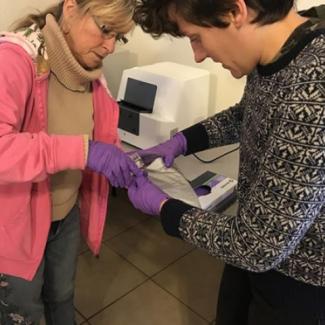- Center investigators collaborated with the Martin County Concerned Citizens Coalition to test residential drinking water, resulting in a UK-CARES-funded community-engaged pilot study and a subsequent NIEHS-funded Research to Action grant to assess the health impacts of disinfection byproducts in the drinking water (R01ES032396, MPIs J. Unrine and A. Hoover).
- Center researchers worked with a high school science teacher and his biology students on a community grant to address concerns about air quality on Perry County school buses. The air quality monitoring project saved the school system $130,000 on the purchase of new low-emission buses through a settlement with Volkswagen, leading to a 13:1 return on investment.

Community Engaged Research
Community Engaged Research (CEnR) is a framework, orientation, or research approach, not a method in itself. The approach focuses on relationships between the communities and academic researchers. Use of this approach requires partnership development, cooperation and negotiation, thinking outside traditional parameters. This method engages the community to identify concerns, be involved in planning, and conducting and disseminating findings.
Register for the Training
The CEnR training module is a product of a meaningful multidirectional community-academic partnership that arose from a coalition leader’s observation of the need for investigators to better understand the context and methods used when planning and executing research with the community. The training module presenters are community partners, citizen scientists, and CEnR investigators. The module and quiz take approximately 45 - 60 minutes. Upon successful completion of the quiz, you will receive a congratulatory email. Register here.
Examples of CEnR Conducted by UK-CARES Members
Additional Resources
Click below to download a PDF list of Acceptable Human Subject Training Resources.
Contact
If you have any questions about the CEnR training module please contact Kelly Kennoy at kelly.kennoy@uky.edu or call 859-323-4587.
